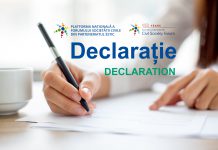Dear First Deputy Prime Minister and distinguished guests,
I am very pleased to be able to celebrate Americas Independence Day with you. Tomorrow, July 4th, is one of the most important days of the year to Americans, because it represents the day on which we began our journey as an independent nation. American embassies throughout the world invite friends and colleagues to commemorate this day with us.
On this occasion, we are honoring one special part of U.S.-Moldovan relations: the partnership between the state of North Carolina and the Republic of Moldova. This partnership began in 1999. Since that time, universities, communities and individuals from North Carolina have collaborated with Moldovans on health, education and cultural projects. North Carolina institutions have also donated medical equipment, books and supplies to Moldovan institutions. On the back of your programs, you will find a few examples of the many projects that have resulted from this relationship.
As I think about the partnership between the United States and Moldova, I look beyond the obvious differences and note how much we have in common. Both Moldova and the United States are multi-ethnic countries. Our countries are not defined by a single ethnic group with a single language. Multiple languages are heard in our offices, markets and schools. The United States and Moldova are home to people of different cultural and historical backgrounds who live side by side and work together.
Less obviously, but equally significant, both nations have struggled to create a common identity and to build a country in which all its residents felt comfortable living. Although the United States declared independence from England on July 4th, 1776, it took almost one hundred years before Americans considered themselves citizens of one nation. Most people who lived in the United States during the first decades of independence identified most strongly with the state in which they lived. Our country was merely a union of disparate states and we talked of the United States in the plural: the United States are.”
Regional differences between the north and the south of the United States were so marked, so strong, that they eventually led to a civil war. In 1861, at the beginning of our civil war, General Robert E. Lee opposed the southern states’ decision to secede from the Union, yet he decided to fight for the southern states because he felt compelled to choose the side of his native state, Virginia. Only at the end of the civil war in 1865 did the United States emerge as a single nation with a distinctive character, and we began to refer to our country in the singular: the United States is.”
Seen from this perspective, it is not so surprising that, after 17 years, citizens of Moldova are still debating issues of identity, history and social unity. Americans, too, have been debating these issues for a long time. We identify culturally with Great Britain, the country from which we declared ourselves independent, and we share common values with Europeans. At the same time, we carry inside us the experiences of African slaves, of Hispanic farm workers, of Chinese railroad builders, of Jewish World War II refugees and of our indigenous Native American tribes.
Perhaps, these commonalities explain the affinity between the United States and Moldova, and provide a basis for Americas continued interest in the future of Moldova. Perhaps, they explain why Americans, both through our government and as private citizens, maintain partnerships and friendships with the Moldovan people and support your progress along the path of democratic development.
In closing, allow me to wish the people of Moldova strength to continue the hard work of building your country, patience to overcome the inevitable obstacles to raising the standard of living of Moldovan citizens, tolerance to respect those who hold different opinions, and satisfaction, pride and joy that come with creating a better Moldova.



